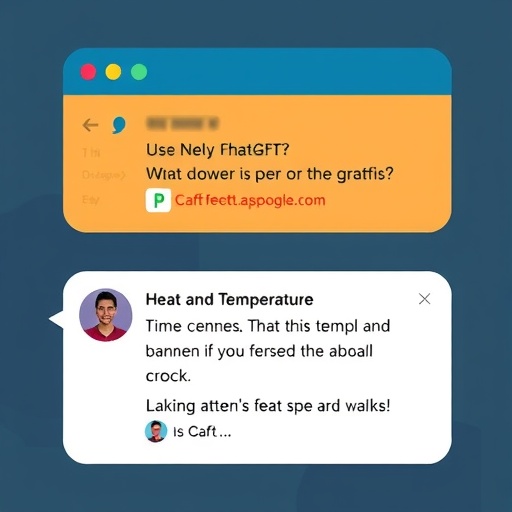In an era where technology and education increasingly intertwine, the recent exploratory study on the integration of ChatGPT in STEM education has garnered significant attention. This research specifically focuses on how this advanced AI model enhances teaching, particularly in the realms of heat and temperature, a fundamental topic in the scientific curriculum. For educators seeking innovative tools to foster student engagement and understanding, the findings offer promising insights into the application of AI in learning environments.
ChatGPT has revolutionized various sectors with its natural language processing capabilities, and its potential in education is being meticulously examined. As the study highlights, heat and temperature are not merely abstract concepts; they are essential components of the physical sciences that require students to grasp both theoretical and practical aspects. Through the lens of AI, educators can bridge the gap between textbook knowledge and real-world applications, making these scientific principles more relatable to students.
The researchers, Utami et al., conducted a comprehensive investigation into the effectiveness of using ChatGPT as an instructional tool in the classroom setting. The study aimed to understand how AI can provide personalized support to students, catering to different learning paces and styles. This personalization is one of the hallmarks of ChatGPT, as it can tailor responses based on the specific inquiries and comprehension levels of students.
What sets this study apart is its exploratory nature. The researchers utilized a combination of qualitative and quantitative methods to assess how ChatGPT influences student engagement, understanding, and enthusiasm for the subject of heat and temperature. The inquiry revealed that when students interacted with the AI, they exhibited higher levels of curiosity and motivation, two key drivers of effective learning.
One significant aspect of utilizing ChatGPT is its ability to simulate conversations that would typically occur between a student and a teacher. The AI’s interactive nature encourages collaborative learning environments, where students feel comfortable asking questions and seeking clarifications. This is particularly important in STEM disciplines, where misconceptions can easily arise if foundational concepts are not solidified.
Moreover, the study discusses the pedagogical implications of integrating AI like ChatGPT into the curriculum. One of the findings suggests that students not only retained information better but also developed critical thinking skills as they navigated through AI-generated explanations and problem-solving scenarios related to heat and temperature. This shift from passive to active learning is vital for fostering independent learners who can tackle challenges beyond the classroom.
Another noteworthy consideration is the role of educators in the context of AI-driven learning. The study emphasizes that while ChatGPT can serve as a significant supplement to traditional teaching methods, it is not a substitute for human interaction. Educators remain essential in guiding discussions, providing context, and facilitating deeper understanding. The combination of AI assistance and teacher-led instruction forms a powerful synergy that can elevate students’ educational experiences.
Additionally, the researchers observed that students were more likely to engage with challenging concepts when aided by ChatGPT. The AI’s prompt and comprehensive responses help demystify complex topics like thermodynamics by breaking them down into manageable pieces. This aligns with contemporary educational practices that emphasize the need for scaffolding—supporting students as they build upon their knowledge incrementally.
However, the study does not shy away from addressing potential limitations and concerns regarding the reliance on AI in education. During their research, some educators expressed apprehensions about the accuracy of the information provided by ChatGPT, underscoring the importance of ensuring that AI resources are regularly updated and credible. The risks of misinformation highlight the crucial role teachers play in verifying and contextualizing AI-generated content.
Furthermore, accessibility and equity in access to technology are central themes in the discussion about integrating AI in education. The researchers point out that not all students have equal access to the latest technology, which can exacerbate existing educational inequalities. Therefore, it is imperative for institutions to ensure that all students have the opportunity to engage with AI tools like ChatGPT while also nurturing a supportive learning environment.
In fostering a culture of experimentation and innovation within classrooms, the study suggests that educational institutions must be willing to embrace new technologies and pedagogies. Rather than fearing these advancements, educators should view them as opportunities to enhance the learning experience. This entails ongoing professional development and training for teachers to effectively incorporate AI into their teaching practices.
As the educational landscape continues to evolve, the findings from Utami et al.’s research underscore the importance of adaptability in teaching strategies. They stress that educators who are willing to experiment with AI tools can create richer educational experiences that resonate with today’s tech-savvy students. Combining traditional methods with cutting-edge technology not only prepares students for future challenges but also fosters a love for learning that can last a lifetime.
In conclusion, the exploratory study demonstrates the significant potential of ChatGPT in STEM education, specifically in teaching heat and temperature. The positive impact on student engagement, understanding, and critical thinking suggests that AI can be an invaluable asset in the educational toolkit. As we move forward, embracing such innovative technologies will be crucial in shaping the future of learning, one that is dynamic, personalized, and deeply engaging.
Subject of Research: Integration of ChatGPT in STEM Education
Article Title: An exploratory study of ChatGPT in STEM teaching on heat and temperature topic
Article References:
Utami, A., Dhitareka, P.H., Husna, H.N. et al. An exploratory study of ChatGPT in STEM teaching on heat and temperature topic.
Discov Educ 4, 309 (2025). https://doi.org/10.1007/s44217-025-00751-9
Image Credits: AI Generated
DOI: 10.1007/s44217-025-00751-9
Keywords: ChatGPT, STEM education, heat and temperature, AI in teaching, educational technology, personalized learning, student engagement, critical thinking.




